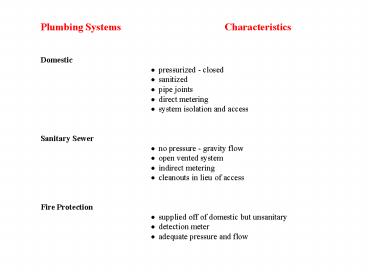Plumbing SystemsCharacteristics - PowerPoint PPT Presentation
Plumbing SystemsCharacteristics
Plumbing Systems Characteristics. Storm Water very large piping system. gravity flow ... Riser Diagram. Plumbing Plan. Fire Protection Systems ... – PowerPoint PPT presentation
Title: Plumbing SystemsCharacteristics
1
Plumbing Systems Characteristics Domestic
? pressurized - closed ? sanitized ?
pipe joints ? direct metering ? system
isolation and access Sanitary Sewer ? no
pressure - gravity flow ? open vented
system ? indirect metering ? cleanouts in
lieu of access Fire Protection ?
supplied off of domestic but unsanitary ?
detection meter ? adequate pressure and flow
2
Plumbing Systems Characteristics Storm Water
? very large piping system ? gravity
flow ? involves both roof and site
drainage Flammable Gases ? constant
venting - void concealment in cavities ?
Connections threaded or welded
3
Venting and Trap Operation
4
Vent System and Terms
5
Sewer Layout
6
Riser Diagram
7
Plumbing Plan
8
Fire Protection Systems Classification of fire
Combustible material determines suppression
material class A fires ordinary combustible
materials water class B fires flammable
liquids foam or CO2 class C fires electrical
foam or CO2 class D fires special
metals Co2 typical fire extinguisher
classification 10 ABC Time temperature curve of
a typical building fire based on numerous test
burns Flashover release of toxic
gases Advantages of sprinkler system building
area increase building height increase avoid
rating some corridor partitions reduced travel
distances lower property insurance life
safety reduction on finish ratings Disadvantages
added cost 1.25 - 1.50 / sf for new
construction accidental release resulting in
considerable property damage
9
Fire Protection Systems Many cities require all
buildings to be sprinklered regardless of
code Three main types of systems wet system
entire system filled with water typical
building dry system filled with compressed air
spaces subject to freezing trip test every year
time required for water to reach most remote
head if system has traps, required to drain off
condensate every week small systems may be wet
systems with antifreeze mix gas system uses gases
to suppress fire protection of rare content
PowerShow.com is a leading presentation sharing website. It has millions of presentations already uploaded and available with 1,000s more being uploaded by its users every day. Whatever your area of interest, here you’ll be able to find and view presentations you’ll love and possibly download. And, best of all, it is completely free and easy to use.
You might even have a presentation you’d like to share with others. If so, just upload it to PowerShow.com. We’ll convert it to an HTML5 slideshow that includes all the media types you’ve already added: audio, video, music, pictures, animations and transition effects. Then you can share it with your target audience as well as PowerShow.com’s millions of monthly visitors. And, again, it’s all free.
About the Developers
PowerShow.com is brought to you by CrystalGraphics, the award-winning developer and market-leading publisher of rich-media enhancement products for presentations. Our product offerings include millions of PowerPoint templates, diagrams, animated 3D characters and more.































